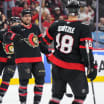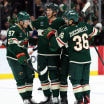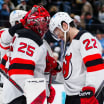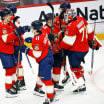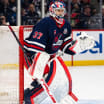Blake Bolden is a professional women's hockey player who became the first black player in the National Women's Hockey League. She has won championships in the NWHL, with the Boston Pride, and the Canadian Women's Hockey League, with the Boston Blades. She currently plays for the Buffalo Beauts of the NWHL. Bolden played four seasons for Boston College, and was named captain of the team in 2012-2013.
The defenseman had 13 points (one goal, 12 assists) this regular season for the Beauts, who were defeated by the Minnesota Whitecaps in the Isobel Cup Final on Sunday.
Here, Bolden talks about her start in hockey and what Gender Equality Month means to her.
What Gender Equality Month means to me: Blake Bolden
First black player in NWHL on her start in game, bright future for women's hockey
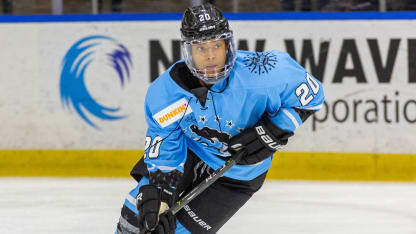
By
Blake Bolden / Special to NHL.com
I grew up in Cleveland, Ohio. Cleveland had not been home to an NHL team since 1978, when the Barons played at Richfield Coliseum, but we did have the Lumberjacks (of the International Hockey League) -- which brought hockey back to my hometown in 1992. My father took a job working security for the Lumberjacks, which meant one thing for me: access. Throughout my childhood, you could find me hanging around the rink and sneaking into locker room areas, just to get a closer look at the ice. It was there I fell in love with hockey, the pace of the play and physical nature of the game. It has been two decades since that spark.
When I was 7 years old, I first asked my dad if I could learn to play. He took me to a used sporting equipment store nearby, and we meticulously picked up all the gear, from head to toe.
My first team was the Tri-County Cyclones, in a local house league. It was a co-ed team, and I didn't mind playing with boys. Even though the league wasn't supposed to be competitive, I turned out to be. I wanted to get better, to be the best. I took power skating lessons and found other programs for ice time to develop my skills. I did it because it was fun. I loved every second of it.
When I reached the point where I was ready to try out for a travel team, I was nervous. My fear never came from a place of not feeling included as a girl, but more about my confidence for how my skills measured up. The team was named after the old NHL franchise, the Cleveland Barons, and I can still remember the coach. He marched up to me before the tryout with a challenge: "don't make my job easy," he said. He promised I would be evaluated only for what mattered --my skill, work ethic, determination, and passion for the game.
Sure enough, I made the team. In the beginning of the season, it took some time for the rest of the team -- comprised of all boys -- to warm up to me playing alongside them. At first I was timid, afraid to make mistakes or speak up. I was the only girl and African-American, I was looked at funny because of it. I had to gain their respect by playing tough. Before long, I was just another teammate. And not long after that, they were going above and beyond to stick up for me. The name-calling because of my gender and race was outrageous. My guys weren't having it. It made me proud that I broke through the obstacles of my differences and it no longer mattered.
When I was 12 years old, playing for the Barons, I was presented with my first opportunity to play on an all-girls team, the Ohio Flames. While I loved playing with and against the boys, I knew there would be something special when we had a team of our own. I joined the Flames for a tournament and realized I was about four years younger than any of the other players. I was intimidated at first, but the team's camaraderie, passion and leadership welcomed me in and I could not be more appreciative.
I turned down an offer to stay with the Flames the following season because I was headed to Northwood Prep School in Lake Placid, New York, the home to the 1932 and 1980 Olympics. I struggled early on. My skill level was adequate, but I found myself taking more than my fair share of penalties. I think back to my time playing only with and against boys, and I realize I was in survival mode for a long time. I was protecting myself and had developed an aggressive side to my game that many of the girls in Lake Placid had not, given their different development experiences. I had to restructure my game, learning to keep the physical aspects of who I was as a player, but in a way that fit within the style and rules of the league.
It was at Northwood in 2006 when a very important "hockey moment" happened to me. That year, Boston College played Minnesota-Duluth in the Women's Frozen Four in Lake Placid. The game went to triple overtime, we were on the edge of our seats. The entire time, I was amazed by the power, speed, skill and emotion of each woman on those two teams… I wanted to be one of them. The experience as a spectator sparked something in me - I was destined for BC!
I worked hard and was fortunate enough to have that dream come true. And when it did, I knew my platform had been raised to another level. Not only the platform of being a female collegiate athlete but being an African-American female athlete in a sport that lacked that type of diversity.
I'm proud of what I have accomplished and grateful for this platform. Growing up, I didn't see individuals who looked like me playing. It never mattered to me. I was in it for the love of the game. Maybe I had a little more to prove than everyone else, given my gender or race. I figured if I worked hard and let my talent shine through, I would gain the respect of my teammates and the people around me, no matter what.
Looking back, I think the voice in your head that might say, "this game isn't for people that look like me," is just a negative social construct that has no basis in truth. That line of thinking was not part of who I was, and I've felt successful throughout my development because of my positivity -- I'm a hockey player, as much as anyone else on the ice is. This is a game for everyone and talent is everywhere and within everyone. I hope my journey helps inspire other young girls, and young people of color, to get involved in hockey and show the world what they can do.
It has been great to see how the game is growing for young girls and the pathways and opportunities now available for women. This season in Buffalo, I experienced such love and respect from the community for our Beauts. I look around the arena and about town at all the young girls wearing their team's jersey and I can't help but smile. I read about the Beauts on the front page of the Buffalo News and watch highlights and interviews of Beauts players on the MSG Network daily hockey show in Buffalo. I see other professional athletes in town supporting the Beauts by wearing our logo and showing up for joint appearances. It is out of respect for our hockey team, and not just because it is a women's team. Girls and women have an important role to play in hockey's future, and our recent success is only the beginning.

